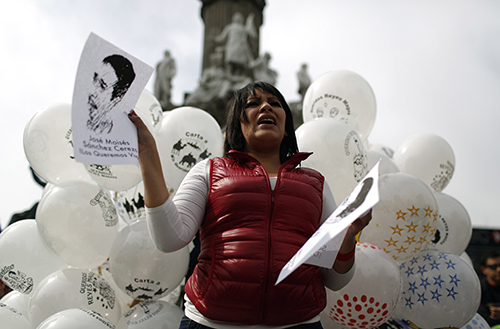New York, January 5, 2015–The Committee to Protect Journalists condemns the abduction of Mexican journalist José Moisés Sánchez Cerezo and calls on authorities to do their utmost to find him and apprehend the perpetrators.
Several unidentified armed men kidnapped Sánchez from his home in the municipality of Medellín de Bravo in central Veracruz on Friday evening and seized the journalist’s computer, camera and other electronic materials, according to news reports. The journalist has not been seen or heard from since, the reports said.
Sánchez worked as a taxi driver and used the money he earned to found La Unión, a small weekly print and online newspaper that covered local events in Medellín de Bravo. The paper often criticized city authorities, particularly the mayor, Omar Cruz Reyes, and denounced local criminal activity as well as the poor quality of basic services like garbage pickup and the absence of street lights. A local journalist who asked to remain anonymous for fear of reprisal told CPJ that Sánchez had not published a print edition in months due to financial constraints. The last story published on La Unión‘s website dates to April, according to CPJ research.
In recent months, according to local journalists and news reports, Sánchez had posted on Facebook critical commentary, links to articles, and videos. He also acted as a source for other Veracruz journalists, whom he often provided with photographs and other information.
In the days before his kidnapping, the journalist posted on Facebook several photographs of protests against the governor, Javier Duarte de Ochoa, as well as links to articles about a recent murder. On December 13 and 14, he posted several articles, press releases, and a video regarding the formation of a neighborhood watch self-defense group in response to local crime. It wasn’t clear whether Sánchez was the author of any of the material posted on Facebook. Besides reporting on its activities, Sánchez was active in the group, according to local news reports.
The journalist who asked to remain anonymous told CPJ that information about self-defense groups was particularly sensitive for local officials who sought to downplay shortcomings in local law enforcement. The journalist’s son, Jorge Sánchez, told The Associated Press that his father had been threatened by the mayor in connection with his coverage of the groups.
In a press conference on Monday, the mayor denied any link to the kidnapping and said he would cooperate with the investigation, according to the AP. State authorities said in a press release today that several municipal police officers had been detained for questioning in connection with the crime, but did not offer further details.
In a press conference on Saturday, Governor Duarte referred to Sánchez as an “activist and taxi driver.” On Sunday, after criticism from local reporters, the state spokesman posted on social media that the governor had met with Sanchez’s family and referred to him as a journalist, according to news reports.
“Veracruz authorities have a history of denigrating the activities of local journalists and a miserable record of impunity in cases of crimes against journalists,” said Carlos Lauría, CPJ’s senior program coordinator for the Americas. “Local authorities must immediately find José Moisés Sánchez Cerezo and bring him home safely and ensure his kidnappers are brought to justice.”
Veracruz is one of the most dangerous states in Mexico for the press, according to CPJ research. Since 2011, at least three journalists have been killed in Veracruz in relation to their work, according to CPJ research. CPJ is investigating the deaths of at least six others in unclear circumstances. At least three journalists have disappeared in the state in the same time period. In the past, Governor Duarte’s government has sought to dismiss any possible link between journalists’ murders and their profession.
Violence tied to drug trafficking has made Mexico one of the most dangerous countries in the world for the press, according to CPJ research. More than 50 journalists have been killed or have disappeared since 2007. The country was ranked seventh on CPJ’s 2014 Impunity Index, which spotlights countries where journalists are slain and the killers go free.
